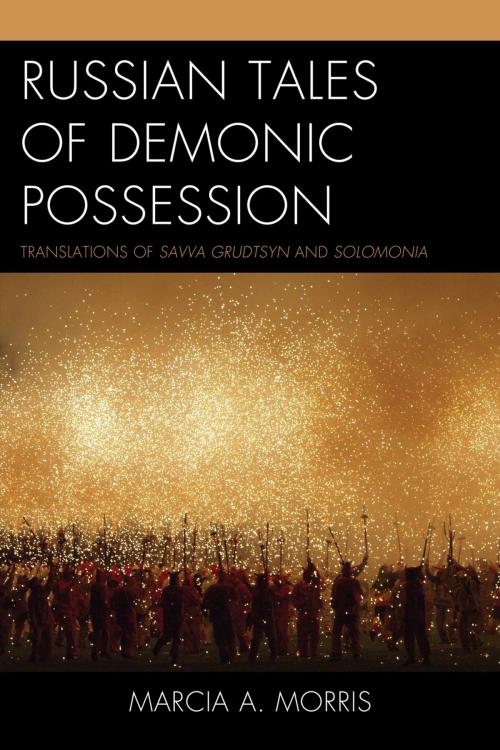Russian Tales of Demonic Possession
Translations of Savva Grudtsyn and Solomonia
Fiction & Literature, Literary Theory & Criticism, European, Russian, Medieval| Author: | Marcia A. Morris | ISBN: | 9780739188613 |
| Publisher: | Lexington Books | Publication: | April 17, 2014 |
| Imprint: | Lexington Books | Language: | English |
| Author: | Marcia A. Morris |
| ISBN: | 9780739188613 |
| Publisher: | Lexington Books |
| Publication: | April 17, 2014 |
| Imprint: | Lexington Books |
| Language: | English |
Russian Tales of Demonic Possession: Translations of Savva Grudtsyn and Solomonia is a translation from the Russian of two stories of demonic possession, of innocence lost and regained. The original versions of both tales date back to the seventeenth century, but the feats of suffering and triumph described in them are timeless. Aleksei Remizov, one of Russia’s premiere modernists, recognized the relevance of the late-medieval material for his own mid-twentieth-century readers and rewrote both tales, publishing them in 1951 under the title The Demoniacs. The volumeoffers a new translation of the original Tale of Savva Grudtsyn as well as first-ever translations of The Tale of The Demoniac Solomonia and Remizov’s Demoniacs.
Russian Tales of Demonic Possession opens with an introduction that interprets and contextualizes both the late-medieval and the twentieth-century tales. By providing new critical interpretations of all four tales as well as a short discussion of the history of demons in Russia, this introduction makes an eerily exotic world accessible to today’s English-speaking audiences.
Savva Grudtsyn and Solomonia, the protagonists of the two tales, are young people poised on the threshold of adulthood. When demons suddenly appear to confront and overmaster them, each of them teeters on the brink of despair in a world filled with chaos and temptation. The Tale of Savva Grudtsyn and The Tale of the Demoniac Solomonia propel us forcibly into the realm of good and evil and pose hard questions: Why does evil afflict us? How does it manifest itself? How can it be overcome? Aleksey Remizov’s modernist re-castings of the two stories offer compelling evidence that these same questions are very much with us today and are still in need of answers.
Russian Tales of Demonic Possession: Translations of Savva Grudtsyn and Solomonia is a translation from the Russian of two stories of demonic possession, of innocence lost and regained. The original versions of both tales date back to the seventeenth century, but the feats of suffering and triumph described in them are timeless. Aleksei Remizov, one of Russia’s premiere modernists, recognized the relevance of the late-medieval material for his own mid-twentieth-century readers and rewrote both tales, publishing them in 1951 under the title The Demoniacs. The volumeoffers a new translation of the original Tale of Savva Grudtsyn as well as first-ever translations of The Tale of The Demoniac Solomonia and Remizov’s Demoniacs.
Russian Tales of Demonic Possession opens with an introduction that interprets and contextualizes both the late-medieval and the twentieth-century tales. By providing new critical interpretations of all four tales as well as a short discussion of the history of demons in Russia, this introduction makes an eerily exotic world accessible to today’s English-speaking audiences.
Savva Grudtsyn and Solomonia, the protagonists of the two tales, are young people poised on the threshold of adulthood. When demons suddenly appear to confront and overmaster them, each of them teeters on the brink of despair in a world filled with chaos and temptation. The Tale of Savva Grudtsyn and The Tale of the Demoniac Solomonia propel us forcibly into the realm of good and evil and pose hard questions: Why does evil afflict us? How does it manifest itself? How can it be overcome? Aleksey Remizov’s modernist re-castings of the two stories offer compelling evidence that these same questions are very much with us today and are still in need of answers.















